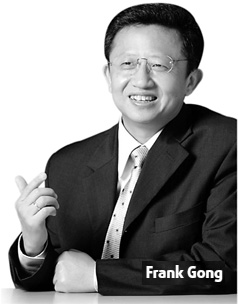

Dubbed "the most amazing prophet of 2008" by Securities Daily, Frank Gong, JP Morgan Chase & Co's head of China research and strategy, successfully cast off all doubts and suspicions regarding his professional abilities when he led his team to win the honor of "Best Research Team in China" - the financial sector's equivalent of the Oscars - for the fourth year in a row at the beginning of May.
As early as August 2008, right before the global financial crisis had started, Gong sent a report to his clients, saying the central government was likely to issue a 2-4 -trillion-yuan economic stimulus plan. The report spread quickly among investors and gave China's stocks a massive shot in the arm.
Gong also said China's economy had already reached the bottom in the fourth quarter of last year, a point he reiterated at a Beijing media briefing on April 10, when he said: "The bear market is gone, and the transition period to a bull market is finished."
He believes China's economy is recovering, and so are companies' profit expectations, and it is without doubt that the stock market will follow suit.

"China's A-share market hasn't seen a ceiling yet. It was definitely a deep bottom around 1,600 or 1,700 points last year, and the market will rise to 2,800 to 3,000 points in the following months," Gong was quoted as saying.
When the Obama administration was worried about its shrinking automobile industry and people expected a 30 percent to 40 percent decrease in the American car market, Gong advocated buying shares in China's auto and real estate sectors. Time has proved Gong absolutely right, as the Chinese automobile market grows into the world's biggest and an obvious recovery has occurred in real estate.
Though Gong has won applause for his remarkable achievements, he admits he can't be always right. Compared with other analysts in market, he thinks he is quite outspoken.
"Don't believe anyone, including people like me. I can't be right all the time. I just can't do it," he said.
When some people challenged Gong's reports and claimed they were designed to help certain institutions make gains, Gong said it was impossible. If you protect a small group of people, you will hurt the majority, he pointed out. "Analysts care about reputation; but meanwhile, they pay more attention to all clients' interests, and don't just provide services for some of them."
Before working with JP Morgan, Gong had no experience researching on stocks or listed companies. But this was not a challenge for this man, known for his "don't do the same" theory.
When he was a student at Peking University he majored in nuclear physics, but then decided that economics was more his cup of tea. Afterwards, he gained a fellowship from the Wharton School of the University of Pennsylvania and obtained his doctorate in finance there.
(China Daily 06/08/2009 page2)













